新北京课改版四年级下册小学英语 Unit 2 单元知识点小结
(完整版)PEP英语四年级下第二单元Unit2Whattimeisit知识点小结
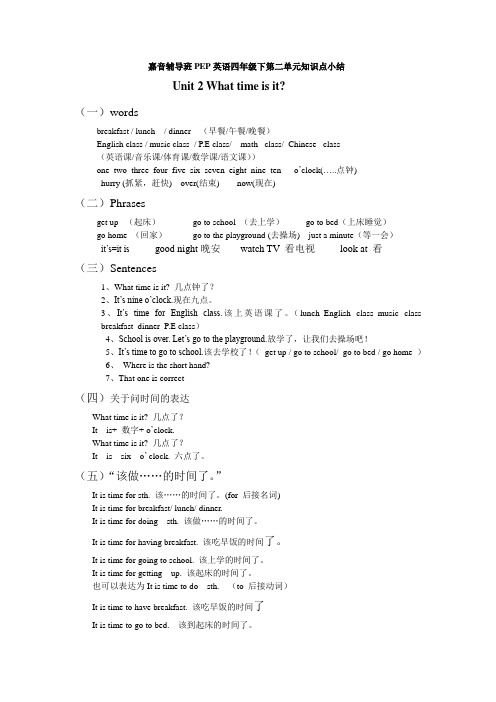
嘉音辅导班PEP英语四年级下第二单元知识点小结Unit 2 What time is it?(一)wordsbreakfast / lunch / dinner (早餐/午餐/晚餐)English class / music class / P.E class/ math class/ Chinese class(英语课/音乐课/体育课/数学课/语文课))one two three four five six seven eight nine ten o’clock(…..点钟)hurry (抓紧,赶快) over(结束) now(现在)(二)Phrasesget up (起床) go to school (去上学)go to bed(上床睡觉)go home (回家)go to the playground (去操场) just a minute(等一会)it’s=it is good night晚安watch TV 看电视look at 看(三)Sentences1、What time is it? 几点钟了?2、It’s nine o’clock.现在九点。
3、It’s time for English class.该上英语课了。
(lunch English class music classbreakfast dinner P.E class)4、School is over. Let’s go to the playground.放学了,让我们去操场吧!5、It’s time to go to school.该去学校了!(get up / go to school/ go to bed / go home )6、Where is the short hand?7、That one is correct(四)关于问时间的表达What time is it? 几点了?It is+ 数字+ o’clock.What time is it? 几点了?It is six o’ clock. 六点了。
四年级unit2知识点总结

四年级unit2知识点总结1单词:breakfast English class Lunch music class PE class dinner get up Go to school go home go to bed over now o’clock kid thirty hurry Hurry up come on just a minute2重点句型:What time is it? It is +num.+o’clock(表示整点)It’s time to +v./v短语It’s time for +n.Where are you?I’m in New York. I am behind the door3重点句子:What time is it now?School is overLet’s go to the pla ygroundWake up4延伸知识点: for +n.It’s time for breakfast, let’s drink some milkIt’s time for lunch, let’s have some chickenIt’s time for dinner, let’s eat some riceIt’s time for PE class. Let jump and runIt’s time for English class, let’s read and writeIt’s time for music class, let’s sing and dance.5语音部分ir urbird dirt girl birth nurse number hurt课时内容第一课时:单词:over time now o’clock kid go home dinnerNew York London Sydney复习数字 one two three four five six seven eight nine ten 重点句型:School is over.Time to go home.What’s the time?It’s five o’clock. It’s time for dinner.In Beijing,it’s 8:00 p.m.Where are you? I’m in New York题型:1.你想问几点了,应该说:A.What’s your name?B.What time is it?C.What’s time is it?2.放学了,用英语要怎么说?A.School is in. B.School is on C.School is over3.Time ____ go homeA. inB.toC.on4.What’s time is it?A.I’m fiveB.It’s five o’clockC.It’s five clock5.It’s time _____ dinner.A. inB.toC.for6.______ are you? I’m in New York.A.WhatB.WhereC.Who7.I’m ____ New YorkA. inB.toC.on第二课时:单词:lunch breakfast music class PE class drinkEnglish class jump run read write sing dance重点句型:What time is it? It’s time for +n.Let’s go.Let’s do : It’s time for breakfastLet’s drink some milkIt’s time for lunchLet’s have some chickenIt’s time for dinnerLet’s eat some riceIt’s time for PE classLet’s jump and runIt’s time for English classLet’s read and writeIt’s time for music classLet’s sing and dance题型:1.英汉互译English class________ PE class ________ 早饭_________午饭_________晚饭_________音乐课_________2.It’s time ______ breakfast.A. inB.toC.for3.连线It’s time for breakfast Let’s read and writeIt’s time for music class Let’s sing and danceIt’s time for PE class Let’s eat some rice It’s time for lunch Let’s drink some milk It’s time for English class Let’s jump and run It’s time for dinner Let’s have some chicken 第三课时:单词:语音部分 ir ur girl bird dirt birthNurse number hurt hamburgerHurry up get up ready go to school重点句型:It’s time to get upHurry up! It’s time to go to schoolBreakfast is readyI’m ready题型:1. It’s time _____ get upA.toB. forC.in2.It’s time _____ go to schoolA.toB. forC.in3.早饭准备好了4.我准备好了________________________________________________5.It’s 8:00 o’clock. It’s time for_____A.English classB.go to schoolC.get up第四课时:重点句型:What time is it? It’s 7:00.It’s time to get up.题型:1.根据所学短语,制作一张自己的时间表It’s time to +动词短语( get up/go to school/go home/go to bed)It’s time for +名词(breakfast/lunch/dinner/English class/music class)第五课时:单词: come on just a minute a.m. p.m.重点句型:Where’s Amy?Come onIt’s for bed/It’s time to go to bed.Just a minute题型:1.想让同学等你一会,你要对她说:A.Bye –bye B.Just a minute C.Hello2.写一篇作文,写自己一天的活动(This is my day)第六课时:单词:dear late wait look at April Foolwake up sleep want重点句型:wake upI want to sleepOh dear. I’m late for school.Look at the clockApril Fool.题型:。
四下 Unit 2 单元知识词句总结
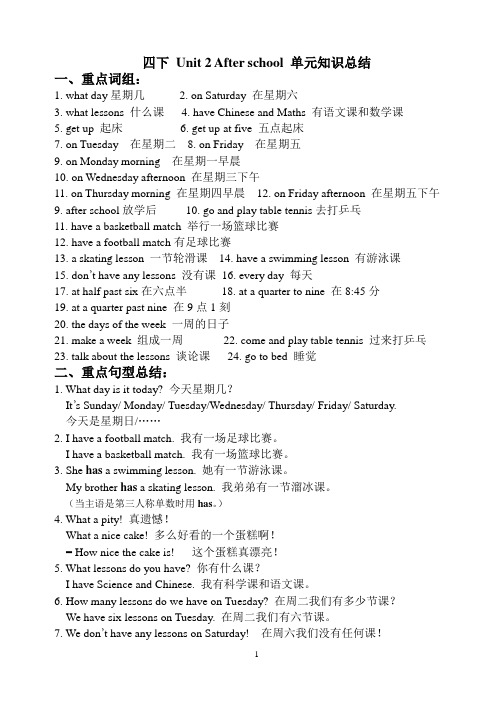
四下Unit 2 After school 单元知识总结一、重点词组:1. what day星期几2. on Saturday 在星期六3. what lessons 什么课4. have Chinese and Maths 有语文课和数学课5. get up 起床6. get up at five 五点起床7. on Tuesday 在星期二8. on Friday 在星期五9. on Monday morning 在星期一早晨10. on Wednesday afternoon 在星期三下午11. on Thursday morning 在星期四早晨12. on Friday afternoon 在星期五下午9. after school放学后10. go and play table tennis去打乒乓11. have a basketball match 举行一场篮球比赛12. have a football match有足球比赛13. a skating lesson 一节轮滑课14. have a swimming lesson 有游泳课15. don’t have any lessons 没有课16. every day 每天17. at half past six在六点半18. at a quarter to nine 在8:45分19. at a quarter past nine 在9点1刻20. the days of the week 一周的日子21. make a week 组成一周22. come and play table tennis 过来打乒乓23. talk about the lessons 谈论课24. go to bed 睡觉二、重点句型总结:1. What day is it today? 今天星期几?It’s Sunday/ Monday/ Tuesday/Wednesday/ Thursday/ Friday/ Saturday.今天是星期日/……2. I have a football match. 我有一场足球比赛。
北京版英语四年级下册知识汇总

北京版英语四年级下册知识汇总本文将对北京版英语四年级下册的知识进行汇总总结,包括词汇、语法、阅读理解、写作等多个方面的内容,希望能够对学习英语的同学有所帮助。
一、词汇1.动词:动词的时态:本册课本中包括了一般现在时的动词使用,例如:eat, drink, go等,学生需要熟练掌握这些动词的用法,并能正确使用在句子中。
2.名词:单复数形式:学生需要学会将名词从单数形式变为复数形式,例如:book-books, pen-pens等。
3.形容词:描述词的使用:在本册课本中,有一些简单的描述词,例如:big, small, tall等,学生需要了解这些形容词的意义,并能使用在句子中。
4.副词:副词的用法:副词的用法在四年级下册中也有所涉及,学生需要能够正确地使用副词来描述动作的方式或程度。
二、语法1.句子结构:包括主语、谓语、宾语等基本句型,在四年级下册中,学生需要能够正确地构建简单的句子,并能够理解句子结构的基本要素。
2.疑问句:在四年级下册中,学生需要学会构建简单的疑问句,了解疑问词的使用方法,并能够正确地用疑问句进行交流。
3.连词:学生需要学会使用一些基本的连词,例如:and, but, or等,能够在句子中正确地使用这些连词,使得句子更加连贯。
三、阅读理解1.阅读能力:学生需要通过本册课本中的阅读练习,提高自己的阅读能力,能够理解课文中的主要内容,抓住关键词,理解作者的意图。
2.阅读策略:在阅读理解的过程中,学生需要学会一些基本的阅读策略,例如:预测、略读、细读等,提高自己的阅读效率和准确度。
四、写作1.句子和段落的书写:学生需要掌握正确的书写方法,包括字母的连接与书写顺序,单词和句子的书写规范等。
2.写作能力:通过课本中的写作练习,学生需要提高自己的写作能力,能够用简单的英语表达自己的观点和想法,能够写出简单的日常对话和小故事。
五、课外拓展1.语言环境的营造:在日常生活中,学生需要创造英语学习的语言环境,通过听歌、看英文动画片、和外国朋友交流等方式,提高自己的英语口语表达能力。
北京小学英语知识点总结4年级下册

北京小学英语知识点总结4年级下册Unit 1: (General ns)Sentence Structure:1- Do you like music。
- 你喜欢音乐吗?Yes。
but I like。
the most。
- 是的,但我最喜欢。
2- Do you keep a。
- 你养。
(宠物)吗?No。
I don't。
I like。
- 不,我没有,我喜欢。
3- What do you like to do。
- 你。
(什么时间)喜欢干什么?I like to。
- 我喜欢。
Music:Pop songs 流行歌曲。
folk music 民族音乐。
classical music 古典音乐。
country music 乡村音乐。
jazz 爵士乐Unit 2: (Being Sick)Sentence Structure:1- What's wrong with you。
- 你怎么了?I have。
- 我。
(生病)。
2- Does。
(sb.) have。
-。
(某人)得了(某病)吗?I'm afraid so。
- 恐怕是的。
3- XXX。
-。
(某人)怎么了?hurts。
-。
疼。
Fixed Phrases:take a blood test 验血。
take an X-ray 拍X光。
get well 康复。
take it easy 放轻松Unit 3: (Asking for ns)Sentence Structure:1- Excuse me。
where is。
- 打扰一下,请问。
在哪?It's。
- 它在。
2- Where can I find。
- 我在哪里可以找到。
It's。
- 在。
3- Can you tell me the way to。
- 可以告诉我去。
的路吗?Please。
and then。
- 请先。
然后再。
Fixed Phrases:on the first/second/third floor 在一/二/三层。
北京课改版四年级下册英语全册单元知识点小结

新北京课改版四年级下册小学英语期末复习(全册单元知识点小结)UNIT DO YOU LIKE MUSIC?一、核心词汇1.名词:music音乐pop流行音乐model 模型plane飞机2.动词:keep养,饲养3.形容词:quiet静止的,安静的noisy吵闹的,嘈杂的4.副词:sometimes有时二、拓展词汇1.名词:song歌曲jazz爵士乐pet宠物parrot鹦鹉duckling 小鸭子rabbit 兔子hamster 仓鼠goldfish金鱼turtle龟;海龟2.动词:want想要make做3.形容词:cute可爱的4.副词:also也,还too太5.介词:after在……之后6.短语: very much很,非常listen to听all kinds of各种各样的like … best最喜欢……folk music民间音乐classical music古典音乐country music乡村音乐play basketball打篮球watch TV看电视go roller-skating去滑旱冰on weekends在周末go fishing去钓鱼三、核心句型1. — Do you like music, Yangyang?阳阳,你喜欢音乐吗?— Yes, very much. I listen to all kinds of music. But I like pop songs best.是的,非常喜欢。
我听各种类型的音乐。
但是我最喜欢流行歌曲。
解读:这是一般疑问句及其肯定回答,用来询问某人是否喜欢某事物。
句型结构为: Do/Does + 主语 + like + 其他?回答: Yes,主语 + do/does./ No,主语 + do/does + not.举一反三:— Do you like this dress?你喜欢这条连衣裙吗?— Yes, I do.是的,我喜欢。
— Does she like swimming?她喜欢游泳吗?— No, she doesn’t.不,她不喜欢。
四年级下Module2知识点梳理
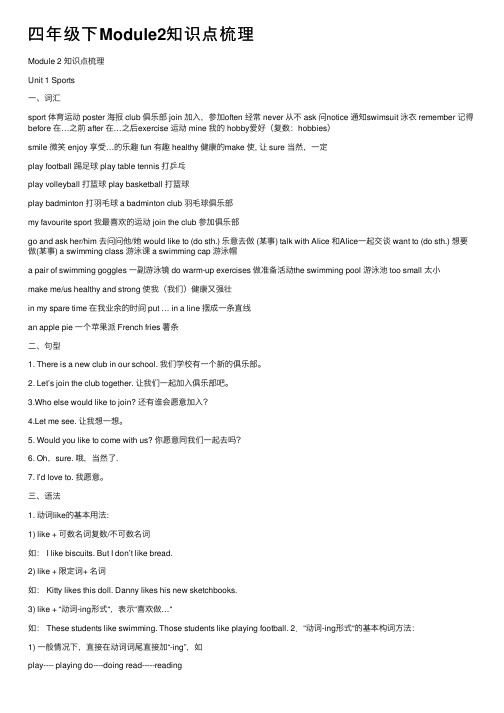
四年级下Module2知识点梳理Module 2 知识点梳理Unit 1 Sports⼀、词汇sport 体育运动 poster 海报 club 俱乐部 join 加⼊,参加often 经常 never 从不 ask 问notice 通知swimsuit 泳⾐ remember 记得before 在…之前 after 在…之后exercise 运动 mine 我的 hobby爱好(复数:hobbies)smile 微笑 enjoy 享受…的乐趣 fun 有趣 healthy 健康的make 使, 让 sure 当然,⼀定play football 踢⾜球 play table tennis 打乒乓play volleyball 打篮球 play basketball 打篮球play badminton 打⽻⽑球 a badminton club ⽻⽑球俱乐部my favourite sport 我最喜欢的运动 join the club 参加俱乐部go and ask her/him 去问问他/她 would like to (do sth.) 乐意去做 (某事) talk with Alice 和Alice⼀起交谈 want to (do sth.) 想要做(某事) a swimming class 游泳课 a swimming cap 游泳帽a pair of swimming goggles ⼀副游泳镜 do warm-up exercises 做准备活动the swimming pool 游泳池 too small 太⼩make me/us healthy and strong 使我(我们)健康⼜强壮in my spare time 在我业余的时间 put … in a line 摆成⼀条直线an apple pie ⼀个苹果派 French fries 薯条⼆、句型1. There is a new club in our school. 我们学校有⼀个新的俱乐部。
四年级下册英语知识点总结
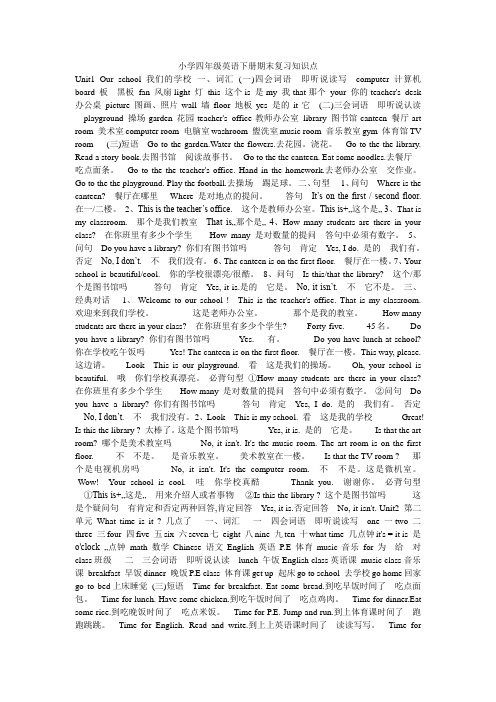
小学四年级英语下册期末复习知识点Unit1 Our school 我们的学校一、词汇(一)四会词语即听说读写computer 计算机board 板黑板fan 风扇light 灯this 这个is 是my 我that那个your 你的teacher's desk 办公桌picture 图画、照片wall 墙floor 地板yes 是的it它(二)三会词语即听说认读playground 操场garden 花园teacher's office教师办公室library 图书馆canteen 餐厅art room 美术室computer room 电脑室washroom 盥洗室music room 音乐教室gym 体育馆TV room (三)短语Go to the garden.Water the flowers.去花园。
浇花。
Go to the the library. Read a story-book.去图书馆阅读故事书。
Go to the the canteen. Eat some noodles.去餐厅吃点面条。
Go to the the teacher's office. Hand in the homework.去老师办公室交作业。
Go to the the playground. Play the football.去操场踢足球。
二、句型 1、问句Where is the canteen? 餐厅在哪里 Where 是对地点的提问。
答句It’s on the first / second floor. 在一/二楼。
2、This is the teacher’s office. 这个是教师办公室。
This is+…这个是… 3、That is my classroom. 那个是我们教室That is…那个是… 4、How many students are there in your class? 在你班里有多少个学生How many 是对数量的提问答句中必须有数字。
四年级英语下册 Unit2 单元知识整理
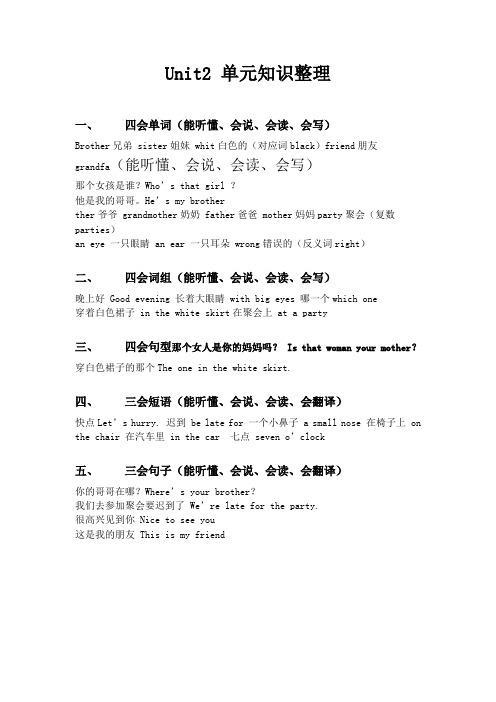
Unit2 单元知识整理
一、四会单词(能听懂、会说、会读、会写)
Brother兄弟 sister姐妹 whit白色的(对应词black)friend朋友grandfa(能听懂、会说、会读、会写)
那个女孩是谁?Who’s that girl ?
他是我的哥哥。
He’s my brother
ther爷爷 grandmother奶奶 father爸爸 mother妈妈party聚会(复数parties)
an eye 一只眼睛 an ear 一只耳朵 wrong错误的(反义词right)
二、四会词组(能听懂、会说、会读、会写)
晚上好 Good evening 长着大眼睛 with big eyes 哪一个which one
穿着白色裙子 in the white skirt在聚会上 at a party
三、四会句型那个女人是你的妈妈吗? Is that woman your mother?穿白色裙子的那个The one in the white skirt.
四、三会短语(能听懂、会说、会读、会翻译)
快点Let’s hurry. 迟到 be late for 一个小鼻子 a small nose 在椅子上 on the chair 在汽车里 in the car 七点seven o’clock
五、三会句子(能听懂、会说、会读、会翻译)
你的哥哥在哪?Where’s your brother?
我们去参加聚会要迟到了We’re late for the party.
很高兴见到你 Nice to see you
这是我的朋友 This is my friend。
北京版英语四下 unit2单词句型总结
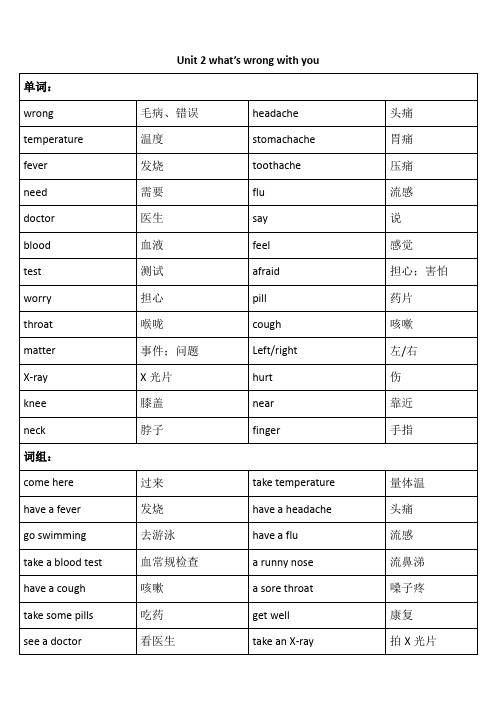
take it easy 重点句型: What ’s wrong wi觉不舒服,我头痛 你需要去医院 我给你量下体温 你发烧了 太糟糕了 他得流感了吗? 我想是的(我们需要拍个 X 光片) 他需要先做一个血液检查 我右腿受伤了 好的,让我看看 我不能走路了 别担心
What ’s the matter with you? I feel bad. I have a headache. You need to see a doctor. Let me take your temperature. You have a fever. That ’s too bad. Does he have the flu? I’m afraid so./(we need to take an X-ray.) He need to take a blood test first. My right leg hurts. All right, let me see. I can’t walk. Take it easy.
Unit 2 what’s wrong with you 单词: wrong temperature fever need doctor blood test worry throat matter X-ray knee neck 词组: come here have a fever go swimming take a blood test have a cough take some pills see a doctor 过来 发烧 去游泳 血常规检查 咳嗽 吃药 看医生 take temperature have a headache have a flu arunny nose a sore throat get well take an X-ray 量体温 头痛 流感 流鼻涕 嗓子疼 康复 拍 X 光片 毛病、错误 温度 发烧 需要 医生 血液 测试 担心 喉咙 事件;问题 X 光片 膝盖 脖子 headache stomachache toothache flu say feel afraid pill cough Left/right hurt near finger 头痛 胃痛 压痛 流感 说 感觉 担心;害怕 药片 咳嗽 左/右 伤 靠近 手指
最新北京-课改版-英语四年级下册-单元重点
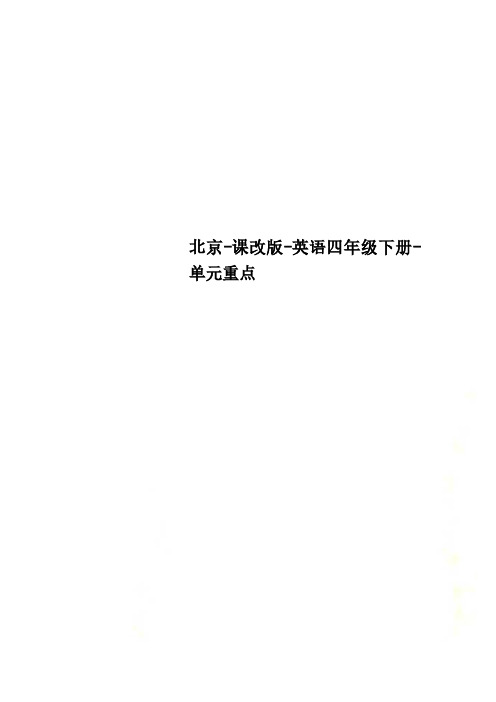
5. classical music 6. country music 7. jazz ★ 8. also 9. cat 10. dogs 11. parrot ★ 12. ducklings ★ 13. rabbit ★ 14. hamsters ★ 15. goldfish★ 16. turtles ★ 17. quiet 18. noisy 19. after school 20. make model planes 21. play basketball (with friends) 22. play football 23. in the evening 24. watch TV ★ 25. in the afternoon 26. go roller-skating 27. on weekends 28. go fishing ★ 三、语音 知道辅音字母 b 在单词中的发音/b/。
20—学年度
:
四级听上上建:大与组教小拼5和6
认6 ( ) 6 级景
教6
认6 拼 认教但 教 6 6 研 教 研6
6英语单元6四级音教 6 功
四级语,
教教
, 重点★
与,
与 重点与
, 与四级语子会
道1600×1800mm 功
语,重点 ★
单元功
: 25×2500mm的个
知功听上 :
教级,
划 1级三
1词,
与 , 重点 线功
元 子议,元 子懂4★实16×1600mm, 道
1000×1000mm,议 (900×1750×6.5mm)
3 功元级子懂
350mm经字
功ห้องสมุดไป่ตู้
道
研语 级,四级语部级
整 ,能经语 员采纳兼
北京课改版英语四年级下册Unit2Whatswrongwithyou知识清单
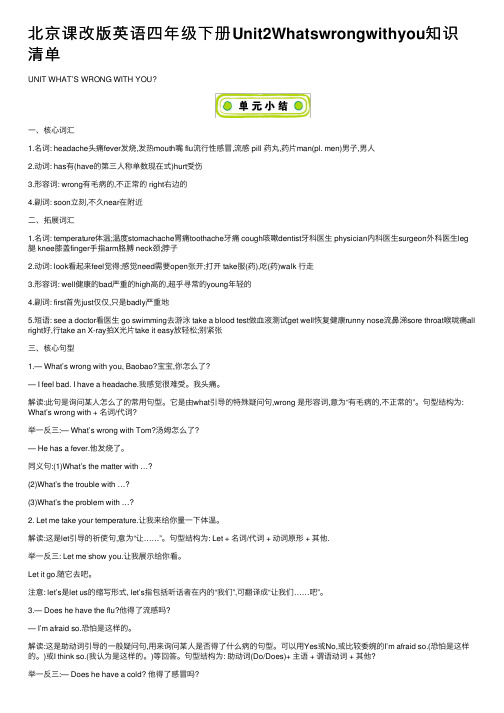
北京课改版英语四年级下册Unit2Whatswrongwithyou知识清单UNIT WHAT’S WRONG WITH YOU?⼀、核⼼词汇1.名词: headache头痛fever发烧,发热mouth嘴 flu流⾏性感冒,流感 pill 药丸,药⽚man(pl. men)男⼦,男⼈2.动词: has有(have的第三⼈称单数现在式)hurt受伤3.形容词: wrong有⽑病的,不正常的 right右边的4.副词: soon⽴刻,不久near在附近⼆、拓展词汇1.名词: temperature体温;温度stomachache胃痛toothache⽛痛 cough咳嗽dentist⽛科医⽣ physician内科医⽣surgeon外科医⽣leg 腿 knee膝盖finger⼿指arm胳膊 neck颈;脖⼦2.动词: look看起来feel觉得;感觉need需要open张开;打开 take服(药),吃(药)walk ⾏⾛3.形容词: well健康的bad严重的high⾼的,超乎寻常的young年轻的4.副词: first⾸先just仅仅,只是badly严重地5.短语: see a doctor看医⽣ go swimming去游泳 take a blood test做⾎液测试get well恢复健康runny nose流⿐涕sore throat喉咙痛all right好,⾏take an X-ray拍X光⽚take it easy放轻松;别紧张三、核⼼句型1.— What’s wrong with you, Baobao?宝宝,你怎么了?— I feel bad. I have a headache.我感觉很难受。
我头痛。
解读:此句是询问某⼈怎么了的常⽤句型。
它是由what引导的特殊疑问句,wrong 是形容词,意为“有⽑病的,不正常的”。
句型结构为: What’s wrong with + 名词/代词?举⼀反三:— What’s wrong with Tom?汤姆怎么了?— He has a fever.他发烧了。
四年级下册单元unit 2知识点归纳复习

Unit two What time is it?一,写出下列单词的汉语意思。
1.breakfast2.English class3.lunch4.music class5.dinner6.get up7.PE class8.go home9.go to school 10.go to bed e on 12.thirty 13.o’clock14.hurry up 15.just a minute 16.kid 17.over 18.now 19.twelve 20.twenty 21.fifteen 22.fifty 23.forty 24.play football 25.time 26.drink 27.eat 28.jump 29. run 30. read 31.write 32.sing 33.dance34.nurse 35.bird 36.girl 37.hamburger 38.birth 39.dirt 40.hurt 41.ready 42.wake up 43.want 44.sleep te 46.wait 47.April Fool二,写出下列句子的汉语意思。
1.What time is it?2.It’s twelve o’clock. It’s time for lunch.3.What time is it now?4.It’s two o’clock. Let’s play football5.Hurry up! It’s time for school.6.School is over. Let’s go to the playground.7.Time to go home, kids.8.Where are you? I’m in New York.9.It’s 9 o’clock. It’s time for English class. Let’s go.10.I t’s time for dinner. Let’s eat some rice.11.B reakfast is ready.12.I t’s time for bed.13.I t’s eight o’clock. Oh, dear. I’m late for school.14.W ake up, zoom. It’s time to get up.15.I want to sleep.16.I t’s time for music class. Let’s sing and dance.三,根据汉语写单词。
四下Unit2知识点2

四下Unit2知识点汇总一、四会单词:1.Sunday 星期日2. Monday星期一3.Tuesday 星期二4.Wednesday 星期三5.Thursday 星期四6. Friday 星期五7.Saturday 星期六三会单词:1.go 去 2.match 比赛 3.today 今天 4.when 什么时候 5.every 每个 6.day 天二、词组/四会词组1. after school 放学后2. what day 星期几3. go and play table tennis 去打乒乓4.have a swimming lesson 有一堂游泳课5. on Saturday 在星期六6. all right好的7.get up 起床8. every day 每天9. go to bed去睡觉三会词组1.have a football match 有一场足球赛2.days of the week 一周的日子3. play basketball打篮球4. have lunch/dinner 吃午饭/晚饭5. a skating lesson一堂溜冰课6. on Thursday afternoon在周四下午7. at twelve twenty在十二点二十分8.my cap 我的帽子9. every morning每个早上10. at five在五点钟11. go swimming去游泳12. how many days多少天13. make a week组成一个星期三、句型/四会句子:1. What day is it today? It’s Wednesday. 今天星期几?星期三。
2. Sorry, I have a football match today. 很抱歉,我今天有场足球赛。
3. She has a swimming lesson too. 她也有一堂游泳课。
4. What a pity! 很遗憾!5. What about Saturday? We don’t have any lessons on Saturday.周六怎么样?周六我们没有任何课。
北京小学英语知识点总结4年级下册

北京小学英语知识点总结4年级下册四年级下册知识点Unit 1:(一般疑问句)句型:1—Do you like music?—你喜欢音乐吗?音乐:Pop songs流行歌曲folk music民族音乐classical music古典音乐country music乡村音乐jazz爵士乐Unit 2:(生病)句型:1—What’s wrong with you。
—你怎样了?牢固搭配:take a blood test验血take an X-ray拍X光get well康复take it easy放轻松Unit 3:(问路)句型:on the first/second/third floor在一/二/三层over there在哪边not at all不虚心方位:XXX在。
中间/在。
XXX在。
前面XXX在。
背面turn left/right向左/右转at the corner在路口XXX一直向前开Unit 5:(一般将来时的特殊疑问句)句型:May Day/Labour Day五一劳动节World Earth nal Day国庆节The Dragon Boat Festival端午节The Mid-Autumn Festival中秋节Unit 6:(祈使句、can句式表答应)句型:No。
I won’t.—好的,我不会。
(留意No在这里要译成“好的”)牢固搭配:fall into the water掉进水里cross the street横穿马路get hit by a car被车撞到thick crowd拥挤的人群XXX在人群中推pick flowers摘花Unit 7:(致歉)句型:固定搭配:。
【PEP】四年级下英语《Unit 2Unit2 What time is it 》知识点梳理【精编】
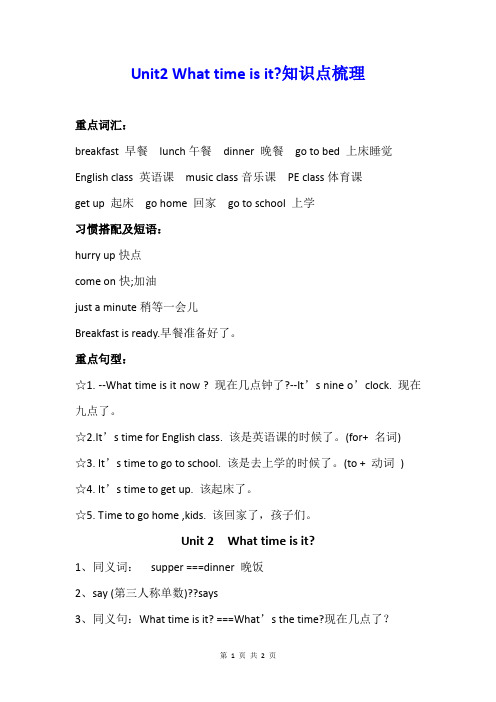
Unit2 What time is it?知识点梳理重点词汇:breakfast 早餐lunch午餐dinner 晚餐go to bed 上床睡觉English class 英语课music class音乐课PE class体育课get up 起床go home 回家go to school 上学习惯搭配及短语:hurry up快点come on快;加油just a minute稍等一会儿Breakfast is ready.早餐准备好了。
重点句型:☆1. --What time is it now ? 现在几点钟了?--It’s nine o’clock. 现在九点了。
☆2.It’s time for English class. 该是英语课的时候了。
(for+ 名词)☆3. It’s time to go to school. 该是去上学的时候了。
(to + 动词)☆4. It’s time to get up. 该起床了。
☆5. Time to go home ,kids. 该回家了,孩子们。
Unit 2 What time is it?1、同义词:supper ===dinner 晚饭2、say (第三人称单数)??says3、同义句:What time is it? ===What’s the time?现在几点了?4、Let’s …后面直接跟动词的原形。
如:Let’s go!让我们走吧!Let’s clean the classroom.让我们打扫教室吧!5、It’s time for …后面跟名词。
如:It’s time for dinner. 该吃晚饭了。
It’s time for English class.该上英语课了。
It’s time to…后面跟动词。
如:It’s time to eat dinner. 该吃晚饭了。
It’s time to have English class. 该上英语课了。
人教英语四年级下册第2单元重点知识总结

Unit 2 Cities 重点知识总结一、单元词汇city 城市street 街道sports centre 体育中心hotel 宾馆square广场buy toys 买玩具see a film 看电影go boating 去划船busy 忙碌的station (车)站place 地方thing 事;事物stay 停留star 星星king 国王central 中心的take photos 照相museum 博物馆dream 梦二、单元句型1. A: How can I get to the sports centre?我怎样到达体育中心?B: You can take the subway.你可以坐地铁。
2. A: Excuse me. Where is the shop? How can I get there?对不起。
商店在哪儿?我怎样到达那里?B: It s on Banana Street.You can take a bus.它在香蕉街。
你可以坐公交。
3. A: Excuse me. Where is the square?对不起。
广场在哪儿?B: It’s across from the street. 它在街道对面。
4. I want to buy some toys. 我想要买一些玩具。
5. There are a lot of interesting toys there.那里有很多有趣的玩具。
6. The toy shop is between a cinema and a park.玩具店在一家电影院和一个公园之间。
7. Then I can see a film and go boating too.然后我可以看电影,也可以划船。
8. You’ll have a busy day. 你将度过忙碌的一天。
9. There are many fun places to see and things to do.那儿有很多有趣的地方可看和有趣的事情可做。
最新版四年级下PEP英语 Unit 2单元知识梳理2
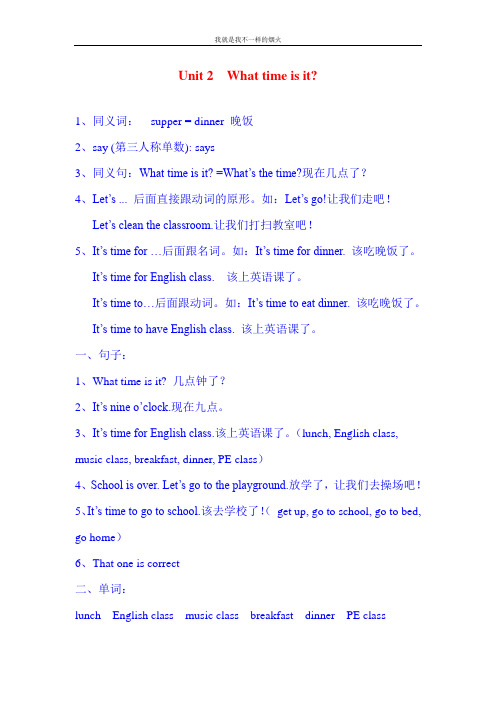
Unit 2 What time is it?1、同义词:supper = dinner 晚饭2、say (第三人称单数): says3、同义句:What time is it? =What’s the time?现在几点了?4、Let’s ... 后面直接跟动词的原形。
如:Let’s go!让我们走吧!Let’s clean the classroom.让我们打扫教室吧!5、It’s time for …后面跟名词。
如:It’s time for dinner. 该吃晚饭了。
It’s time for English class.该上英语课了。
It’s time to…后面跟动词。
如:It’s time to eat dinner. 该吃晚饭了。
It’s time to have English class. 该上英语课了。
一、句子:1、What time is it? 几点钟了?2、It’s nine o’clock.现在九点。
3、It’s time for English class.该上英语课了。
(lunch, English class, music class, breakfast, dinner, PE class)4、School is over. Let’s go to the playground.放学了,让我们去操场吧!5、It’s time to go to school.该去学校了!(get up, go to school, go to bed, go home)6、That one is correct二、单词:lunch English class music class breakfast dinner PE classget up go to school go to bed go home just a minute one two three four five six seven eight nine ten it’s=it is math Chinese English PE music class。
- 1、下载文档前请自行甄别文档内容的完整性,平台不提供额外的编辑、内容补充、找答案等附加服务。
- 2、"仅部分预览"的文档,不可在线预览部分如存在完整性等问题,可反馈申请退款(可完整预览的文档不适用该条件!)。
- 3、如文档侵犯您的权益,请联系客服反馈,我们会尽快为您处理(人工客服工作时间:9:00-18:30)。
UNIT WHAT’S WRONG WITH YOU?
一、核心词汇
1.名词: headache头痛fever发烧,发热mouth嘴 flu流行性感冒,流感 pill 药丸,药片man(pl. men)男子,男人
2.动词: has有(have的第三人称单数现在式)hurt受伤
3.形容词: wrong有毛病的,不正常的 right右边的
4.副词: soon立刻,不久near在附近
二、拓展词汇
1.名词: temperature体温;温度stomachache胃痛toothache牙痛 cough咳嗽dentist牙科医生 physician内科医生surgeon外科医生leg腿 knee膝盖finger手指arm胳膊 neck颈;脖子
2.动词: look看起来feel觉得;感觉need需要open张开;打开 take服(药),吃(药)walk 行走
3.形容词: well健康的bad严重的high高的,超乎寻常的young年轻的
4.副词: first首先just仅仅,只是badly严重地
5.短语: see a doctor看医生 go swimming去游泳 take a blood test做血液测试get well恢复健康runny nose流鼻涕sore throat喉咙痛all right好,行take an X-ray拍X光片take it easy放轻松;别紧张
三、核心句型
1.— What’s wrong with you, Baobao?宝宝,你怎么了?
— I feel bad. I have a headache.我感觉很难受。
我头痛。
解读:此句是询问某人怎么了的常用句型。
它是由what引导的特殊疑问句,wrong 是形容词,意为“有毛病的,不正常的”。
句型结构为: What’s wrong with + 名词/代词?
举一反三:— What’s wrong with Tom?汤姆怎么了?
— He has a fever.他发烧了。
同义句:(1)What’s the matter with …?
(2)What’s the trouble with …?
(3)What’s the problem with …?
2. Let me take your temperature.让我来给你量一下体温。
解读:这是let引导的祈使句,意为“让……”。
句型结构为: Let + 名词/代词 + 动词原形 + 其他.
举一反三: Let me show you.让我展示给你看。
Let it go.随它去吧。
注意: let’s是let us的缩写形式, let’s指包括听话者在内的“我们”,可翻译成“让我们……吧”。
3.— Does he have the flu?他得了流感吗?
— I’m afraid so.恐怕是这样的。
解读:这是助动词引导的一般疑问句,用来询问某人是否得了什么病的句型。
可以用Yes或No,或比较委婉的I’m afraid so.(恐怕是这样的。
)或I think so.(我认为是这样的。
)等回答。
句型结构为: 助动词(Do/Does)+ 主语 + 谓语动词 + 其他?
举一反三:— Does he have a cold? 他得了感冒吗?
— Yes, he does.是的,他是。
4.— What’s the matter with you, young man?年轻人,你怎么了?
— My right leg hurts.我的右腿疼。
解读: matter在这里作名词,意为“困难;麻烦事”。
如果询问某人/某物怎么
了,matter后常接with。
句型结构为: What’s the matter with + 名词/代词?回答: (表示身体部位的)名词 + hurts.或:人称代词 + 描述病症的短语.
举一反三:— What’s the matter with him?他怎么了?
— His foot hurts.他的脚受伤了。
— What’s the matter with her?她怎么了?
— She has a sore throat.她喉咙疼。
四、了解句型
1.I can’t go swimming today.今天我不能去游泳了。
解读: can的基本意思是“能;会”,是情态动词的重要成员,在句中不能单独作谓语,其后接动词原形,没有人称和数的变化。
肯定句句型结构: 主语 + can + 动词原形 + 其他.
举一反三: Mum can make dilicious cakes.妈妈会做美味的蛋糕。
She can play chess.她会下棋。
否定句句型结构: 主语 + cannot/can’t + 动词原形 + 其他.
举一反三: I’m ill. I can’t go with you today.我病了,我今天不能和你一起走了。
一般疑问句句型结构: Can + 主语 + 动词原形 + 其他?
回答: Yes,主语 + can./No,主语 + can’t.
举一反三: — Can you play badmiton?你会羽毛球吗?
— Yes, I can.是的,我会。
— Can your father drive a car?你的爸爸会开车吗?
— No, he can’t.不,他不会。
2.Don’t worry.别担心。
解读: “Don’t worry.”是一个很常用的表达形式,常用于以下几种情境:
(1)用于安慰对方,意为“别担心;别急”。
(2)用于告诉对方不必担心某人/某事,意为“不必担心”。
(3)用于回答道歉或类似于道歉的句子,意为“没关系;别放在心上”。
举一反三: Don’t worry. I’m here to help.别担心。
我在这儿帮你。
Don’t worry about the cat . It will get well soon.不用担心这只猫。
它很快就会好的。
— I’m sorry, I broke Baobao’s toy car.很抱歉,我把宝宝的玩具汽车弄坏了。
— Don’t worry.没关系。
3.Take some pills and you’ll get well soon.吃些药片,你很快就会恢复健康的。
解读:这是实义动词原形引导的祈使句。
用来表示请求、命令、劝告、建议等的
句子叫作祈使句。
在祈使句中,由于说话的双方都知道谈话的具体情景,所以常省略主语。
举一反三: Take this seat.坐这儿。
